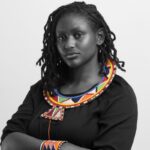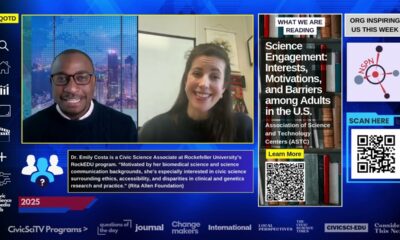Questions of the Day Program
Kago & Cissé share insights on the landscape of African indigenous languages in science engagement
In this segment, CivicSciTV’s Questions of the Day (QOTD) Program launches a special series featuring Special Correspondent Stephanie Okeyo interviewing Dr. Grace Kago and Dr. Mohamed Cissé who in 2022 published an article titled “Using African Indigenous Languages in Science Engagement to Increase Science Trust” in Frontiers in Communication.
https://www.frontiersin.org/journals/communication/articles/10.3389/fcomm.2021.759069/full
Dr. Grace Kago, a life scientist, discusses her work on increasing access to scientific information across language barriers, highlighting the challenges faced during the COVID-19 pandemic and her personal journey to reconnect with her mother tongue. Kago notes, “During the COVID-19 pandemic, one thing that I noticed was that there was a lot of scientific information that was being discovered in real-time, but sometimes some of those details and some of that information was not being translated into different languages.” Dr. Mohamed Cissé, a computer science and applied mathematics researcher, emphasizes the importance of modernizing African languages and incorporating scientific concepts into native languages.
Kago and Cissé explore the cultural and political dimensions of language use in science, the impact of diaspora perspectives, and the role of technology in facilitating multilingual communication. They also offer advice to those working to bridge the gap of knowledge dissemination through multilingual approaches. Kago and Cisse both stress the importance of a long-term, resilient approach. Kago advises, “If you choose to take this road, make sure it is a personal development process as well,” while Cisse adds, “Be patient and resilient. This is a long fight that requires persistence.”
More about the Guests
Dr. Grace Kago is a postdoctoral molecular biologist at The University of Texas Austin and is the creator of Bayoroji, a science education YouTube channel in the Gikuyu language of Central Kenya. Grace aims to increase the discussion of science topics in African mother tongues, and to encourage others to learn and develop their mother tongues. https://www.linkedin.com/in/grace-kago/
https://www.youtube.com/@mbayoroji
Dr. Mohamed Cissé is a mathematician, computer scientist, and co-founder of the African Diaspora Science Federation (ADSF) which aims to create an active networking of African diaspora scientists independently from their home countries.
https://www.linkedin.com/in/mohamed-ciss%C3%A9-6b9066ab/
Additional Readings
Using African Indigenous Languages in Science Engagement to Increase Science Trust – https://www.frontiersin.org/journals/communication/articles/10.3389/fcomm.2021.759069/full
How to Cite this Conversation
Cissé, M., Kago, G., Muindi., FJ & Okeyo, S. Decoding ‘Using African Indigenous Languages in Science Engagement to Increase Science Trust’ Paper. (Video) Civic Science Television Network. June 28, 2024. https://youtu.be/a-FYh4nLT7Y
What action(s) did the insights from the conversation inspire you to take? Let us know here: https://shorturl.at/cQi4E
Stephanie Okeyo is a Microbiologist and Science Communicator. She is the founder of Under the Microscope. Some of her previous professional roles include Ambassador of Women in Science, East Africa and Representative to the United Nations office, Geneva at the Royal Academy of Science International Trust (RASIT). In 2019, she was listed as one of Under 30: Breaking Barriers Women in STEM and is a 2021 Zuri STEM category nominee. Stephanie is passionate about empowering young girls and being a voice for gender equality in Science and Technology.

-
 Audio Studio1 month ago
Audio Studio1 month ago“Reading it opened up a whole new world.” Kim Steele on building her company ‘Documentaries Don’t Work’
-
Civic Science Observer1 week ago
‘Science policy’ Google searches spiked in 2025. What does that mean?
-
Civic Science Observer1 month ago
Our developing civic science photojournalism experiment: Photos from 2025
-
Civic Science Observer1 month ago
Together again: Day 1 of the 2025 ASTC conference in black and white
Contact
Menu
Designed with WordPress
























